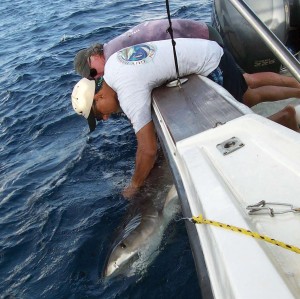NSU Newsroom
SharkBytes
Horizons
This version of NSU News has been archived as of February 28, 2019. To search through archived articles, visit nova.edu/search. To access the new version of NSU News, visit news.nova.edu.
This version of SharkBytes has been archived as of February 28, 2019. To search through archived articles, visit nova.edu/search. To access the new version of SharkBytes, visit sharkbytes.nova.edu.
NSU Shark Research prominently featured in PBS Documentary
Miami, FL.–- Changing Seas, an Emmy award-winning WPBT2 original production, returns to television and the Internet Wednesday, June, 6, 7:30 pm on WPBT2. In the premiere episode, “Tracking Tigers,” the Changing Seas crew works with scientists from Nova Southeastern University’s Guy Harvey Research Institute. Experts use satellite tags and DNA forensic tools to better understand migrations of the magnificent tiger shark and also investigate the impacts of the world’s shark fin trade.
One of those scientists is Mahmood Shivji, Ph.D., director of NSU’s Guy Harvey Research Institute and an international shark expert, who has spent years tagging and tacking the movements of tiger sharks in the Atlantic Ocean.
“To come face to face with a predator as awe-inspiring as a 10-foot tiger shark is the experience of a lifetime,” says Series Producer Alexa Elliott. “We want our audience to see these animals through the eyes of the scientists studying them, so they can gain an appreciation for the sharks. It’s also important to raise awareness of the drastic decline of shark populations around the world targeted by the fin trade.”
In addition to the WPBT2 broadcast, viewers can watch an online preview of “Tracking Tigers” on Thursday, May 31 at 7:30 p.m. EST at http://www.wpbt2.org/webcast. The Changing Seas crew and featured experts will be online to chat with viewers and answer questions. Watch a sneak peek of “Tracking Tigers” here.
Changing Seas, in its fourth season, focuses on ocean issues and exploration. The series goes to sea with explorers and scientists, enabling viewers to experience up close how oceanographers and other experts study earth’s last frontier. Changing Seas is currently carried by 86 percent of PBS stations nationwide. Internationally the series is broadcast in 30 countries, ranging from Spain to South Korea.
For more information on the series visit http://www.changingseas.tv
Funding for this series is made possible by The Batchelor Foundation and Divers Direct.
EPISODE DESCRIPTIONS:
Wednesdays at 7:30 pm
SHOW #401: Tracking Tigers– Broadcast Date: June 6, 2012
Tiger sharks are the ultimate apex predators. Scientists use satellite tags and DNA forensic tools to better understand the migrations of this magnificent species and to investigate the impacts of the world shark fin trade.
SHOW #402: Mysterious Microbes– Broadcast Date: June 13, 2012
On coral reefs, microorganisms are copious creatures. Throughout Florida, scientists painstakingly work to identify key players within this microbial community and directly link a devastating coral disease to a human pathogen.
SHOW #403: Grouper Moon– Broadcast Date: June 20, 2012
During the winter full moons Nassau grouper gather in large numbers to spawn. Most of the known spawning sites have been fished out, but the Cayman Islands are home to the last great reproductive population of this endangered species.
SHOW #404: Coastal Carnivores– Broadcast Date: June 27, 2012
A co-production with Symbio Studios
Scientists studying the coastal Everglades have made some perplexing discoveries. Bull sharks are living upstream where alligators should thrive, and gators are swimming out to the ocean to feed.
###
About WPBT2
South Florida’s premier public broadcaster, WPBT2 is a community-licensed, not-for-profit media enterprise serving communities from the Treasure Coast to the Florida Keys. WPBT2 provides high quality content from PBS, independent acquisitions and its own original productions. WPBT2’s digital media platform, offers: 2HD, a 24-hour high definition channel; Digital 2.2, a mix of Science & Nature Channel, The Florida Channel and Create; Digital 2.3, V-me, a 24-hour national Spanish-language network; and www.wpbt2.org, the WPBT2 website including, Impromp2 (a community blog), the WPBT2 Video Player and uVu, a video sharing website
About Nova Southeastern University and its Oceanographic Center: Situated on 300 beautiful acres in Davie, Fla., Nova Southeastern University (NSU) is the eighth largest not-for-profit independent institution nationally with more than 28,000 students. NSU awards associate’s, bachelor’s, master’s, specialist, doctoral and first-professional degrees in a wide range of fields. Located in Hollywood, Fla., NSU’s Oceanographic Center (OC) has been at the forefront of graduate and undergraduate marine science education and oceanographic research for more than 48 years. The OC house several research institutes. One of them, the NSU Guy Harvey Research Institute, provides the scientific information to understand, conserve, and effectively manage the world’s marine fishes and their ecosystems. The other, the NSU Save Our Seas Shark Center USA, conducts research, education and conservation projects aimed at identifying and finding solutions to the major threats facing the world’s elasmobranch (shark and ray) populations. For more information about the Oceanographic Center and its institutes, visit http://www.nova.edu/ocean/
Media Contact:
Ken Ma, MBA, NSU Office of Public Affairs
954-262-5408 (office), 954-621-7961 (cell), ken.ma@nova.edu
